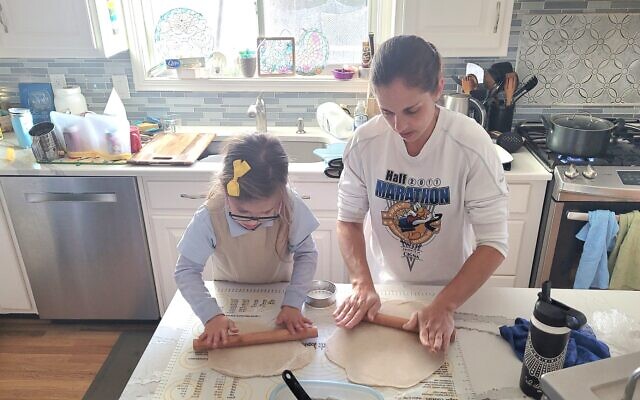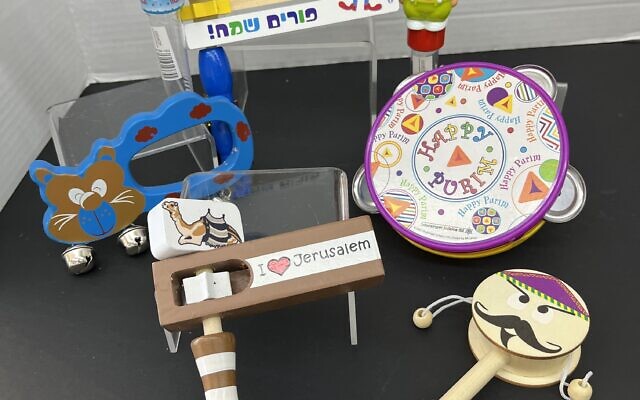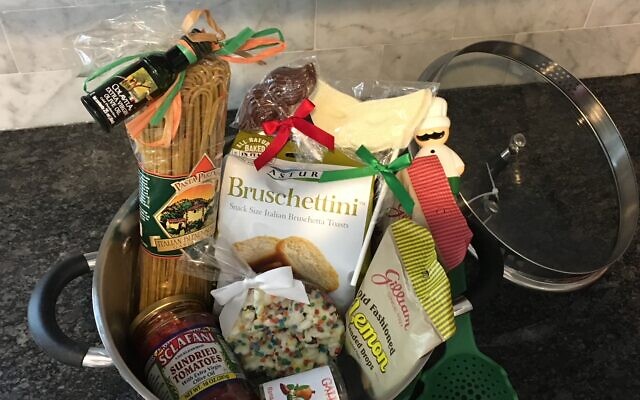In the Spirit of Purim
The AJT spoke to rabbis from three local synagogues to go beneath the familiar surface of this holiday.
Purim, which this year begins at sundown on March 16, is a mix of joy and tragedy. But though we all know about shaking noise makers at a Megillah reading and enjoying a festive meal, wearing costumes, savoring sweet hamantashen and even drinking some wine, there are still many hidden meanings to discover.
The AJT spoke to rabbis from three local synagogues and others from metro Atlanta to go beneath the familiar surface of this holiday.
“Stories we read like the Book of Esther is not only about our past, but also our present and future,” said Rabbi Adam Starr of Ohr HaTorah. “The Megillah’s words have eternal relevance in how its messages resonate even in our time.”

Rabbi Laurence Rosenthal of Ahavath Achim explained that “the four mitzvot (commandments) prescribed by the ancient Story of Esther text are: to hear the reading of that story in the Megillah; to celebrate Purim with a festive meal (Se’udah); to send Mishloach Manot (gifts of food to family and friends); and Matanot L’Evyonim (to give gifts/tzedakah to the poor).”
The Megillah is sometimes referred to as the ganzeh Megillah in Yiddish “because the story of Esther is read all at one time, which, depending on how fast the reader can say all the words, takes an average of 30-40 minutes or more,” said Rabbi Starr. He explained that this special reading takes place two times: during the evening of Purim and the next morning.
As the Megillah is read, groggers or other types of noisemakers drown out the name of the story’s villain, Haman. The tradition goes back to Torah, Starr said, and Chapter 25 (lines 17-19) of Deuteronomy, when the nation of Amalek is mentioned. Haman is believed to have belonged to the same nation, so using noisemakers to obliterate his name became a popular custom.

Hearing the Megillah read out loud each year is a reminder of how close the Jewish people came to being destroyed, except for the courage and wisdom of Queen Esther and her successful plan to save the Jews. Even in 2022, “Hamans exist today as antisemitism is still with us,” Starr said.
In addition to the Megillah reading, the giving of Mishloach Manot is “well established throughout the Jewish community, as synagogues, schools, and other institutions have their own gift-giving programs during Purim to help connect members of their communities to one another” said Rabbi Rosenthal.
AA member Sara Papier and her young family filled Mishloach Manot gift baskets with dozens of homemade hamantashen, which they delivered to friends and neighbors. “Fun traditions like making hamantashen create a deeper connection for my children to Judaism,” she said. For the fillings, they create their own unique flavors.

“It is quite easy to cook down different combinations of fruit and sometimes herbs and spices to make some amazing flavor combinations like apricot peach ginger. The adults also have fun by making cocktail-themed hamantashen like margarita ones garnished with lime salt or sugar rim and old fashion ones using cooked-down cherries with bourbon, sugar and orange zest.”
According to Rosenthal, “each family could make this an incredible expression of generosity and kindness, by not just giving tzedakah (something that Jews do really well already) but by using this mitzvah as a meaningful opportunity to interact with somebody less fortunate around Atlanta. There are many places throughout Atlanta where people in need seek help and resources.”
He recommends that people think about packing a few bags with helpful items, put them in their front seat and give them out when they see somebody in need.
Starr says a fairly new tradition has evolved in which congregants bring boxes of pasta to shake in place of graggers to blot out Haman’s name during the Megillah reading. The improvised noise-makers fulfill two functions at once — following the service, the boxes are placed in a large container to distribute to a local food pantry.
Over in Toco Hills, Keren Fisher chairs an annual AMIT Mishloach Manot Purim Basket Project, which sends significant funds to AMIT Children, an organization that runs 109 schools in 31 cities throughout Israel.

“AMIT currently provides innovative, Jewish values-based education to 44,000 students, most of whom come from disadvantaged backgrounds,” she said. Supporting Israel’s present and future is the main goal of the project. The second goal is to strengthen bonds between Toco Hills community members around Purim by sending each other cards and beautiful baskets filled with gourmet Kosher treats.
In the 1950s, most Jewish children attending their synagogue Purim carnivals had few costume choices. Girls dressed up as Queen Esther and boys could be King Ahashverus, Mordecai or mean Haman. Today, costumes from Spiderman to Wonder Woman are worn by adults and children. Rabbi Max Miller of Temple Emanu-El explained how the tradition of wearing costumes became part of the Purim festivities.
“Dressing up probably originated in the Middle Ages, not before the time of Talmud,” he said. The whole reason we dress up, putting on costumes and masks, is because Esther had to hide her Jewish identity. Miller talked about how, as parents and students, we have different roles, wearing what he called “figurative masks,” not always revealing our innermost thoughts.
The tradition of wearing any kind of costume is a more recent Americanization of the holiday. Miller says the day after Halloween is the best time to find a Purim costume to purchase for the following year. In 2020, he wore a giraffe onesie. This year, look for Rabbi Miller, the dragon. Even his young daughter will be in costume, wearing a red Elmo hooded towel. His wife, Rabbi Rachael Klein Miller, plans to be a praying mantis.

Miller observed that, in Israel, the whole week leading up to Purim feels like a giant party, with citywide festivals in which Israelis dress up in all kinds of costumes and hats while walking the city streets. In metro Atlanta, synagogue-sponsored Purim festivals and parades are part of the festivities.
Congregation Beth Jacob hosted the 30th annual Atlanta Purim Parade & Festival in Toco Hills on March 13. Parade participants rode on about a dozen decorated floats, making their way down Lavista Road. The Beth Jacob float featured Rabbi Ilan D. Feldman, Rabbi Dov Foxbrunner and Rabbi Yitzchok Tendler and their kids, dressed as British aristocrats from the early 1900s.
The festival followed the parade, including many rides, games, music and kosher food trucks. Sarah Faygie Berkowitz, who helped organize the day’s festivities, said that “this event creates unity among different Jewish groups, including schools, youth groups, synagogues, as well as local businesses. It’s truly a joy-filled event for the entire community, cherished by Atlanta families.”

A somber Fast of Esther is conducted on the 13th day of Adar to recall the date when the Jews were supposed to be murdered, but what would a Jewish holiday be without a Se’uda (festive meal)? This commandment, fulfilled after the fast and the reading of the Megillah, may feature a vegetarian menu in honor of Queen Esther, who, according to some legends, probably kept kosher and therefore would not have eaten meat. Triangular kreplach, filled with chicken or meat can also be served.
Most Se’uda desserts would most likely include hamantashen and their sweet fillings. Folklore says the triangle shape is an imitation of Haman’s hat, but scholars assert that hats during the time the Megillah was transcribed did not look like that. Nevertheless, the tradition remains.
- Purim
- Local
- Flora Rosefsky
- Temple Emanu-El
- Ahavath Achim Synagogue
- Congregation Beth Jacob
- Congregation Ohr HaTorah
- Megillah
- hamantashen
- Book of Esther
- rabbi adam starr
- Rabbi Laurence Rosenthal
- mishloach manot
- Matanot L’Evyonim
- ganzeh Megillah
- Haman
- torah
- Sara Papier
- Keren Fisher
- AMIT Mishloach Manot Purim Basket Project
- Rabbi Max Miller
- Rabbi Rachael Klein Miller
- Atlanta Purim Parade & Festival
- Rabbi Ilan D. Feldman
- Rabbi Dov Foxbrunner
- Rabbi Yitzchok Tendler
- Se’uda
- toco hills




comments